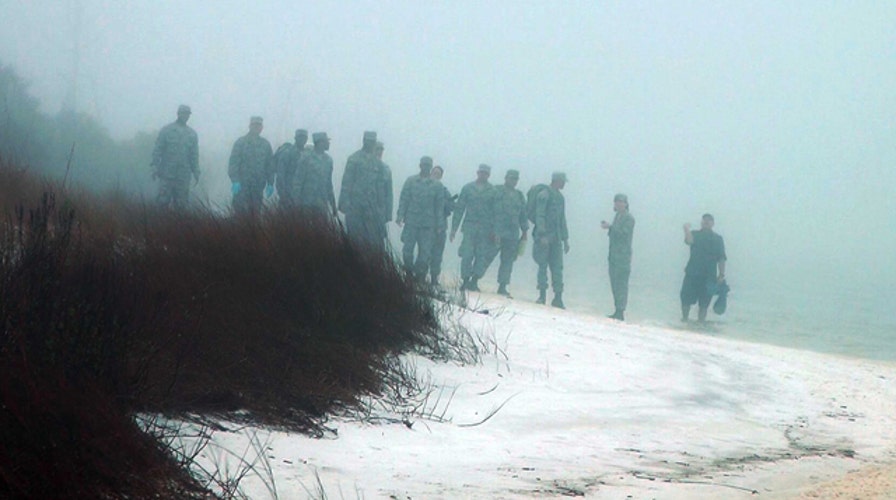11 service members feared dead after chopper crash
Chopper crashed during training mission off Florida coast
The 11 service members who were onboard a Black Hawk helicopter that crashed Tuesday night on the Florida panhandle coastline are presumed dead, a Pentagon official said, but a search-and-rescue operation was still underway Wednesday in a desperate search for survivors.
Seven Marines and four soldiers were onboard a UH-60 helicopter as part of a training exercise when the chopper ran into heavy fog. Human remains and helicopter parts were recovered earlier Wednesday.
"It's a tough day," Maj. Gen. Glenn H. Curtis, the adjutant general of the Louisiana National Guard, where the unit was based. "They're under my command. I take very seriously their safety and well-being, and that of their families."
Kim Urr, 62, who works at the nearby Navarre Beach campground, said she heard a strange sound, followed by two explosions around 8:30 p.m. Tuesday.
"It sounded like something metal either being hit or falling over, that's what it sounded like. And there were two booms afterward, similar to what you hear with ordnance booms, but more muffled," Urr said.
President Obama spoke with the military leaders involved and expressed his condolences to the families before saying he's confident of a detailed and thorough investigation, said his spokesman, Josh Earnest.
"Our thoughts and prayers are with them and their families as the search and rescue continues," Defense Secretary Ash Carter said on Capitol Hill.
The Black Hawk crashed as Marines and National Guardsmen practiced "insertion and extraction missions," using small boats and helicopters to get troops into and out of a target site, said Capt. Barry Morris, spokesman for the Marine Corps Special Operations Command at Camp Lejeune.
Like the Army's Green Berets and the Navy's SEALs, these Marines were highly skilled unconventional warriors, trained to endure grueling conditions and sensitive assignments on land and at sea, from seizing ships to special reconnaissance missions and direct action inside hostile territory.
The helicopter was part of a nighttime training mission Tuesday at Eglin Air Force Base in Florida. There was dense fog in the area at the time of the crash but officials have not said what caused the helicopter to go down.
Fog had reduced visibility to less than two miles at the time, according to the National Weather Service. Another helicopter participating in the exercise turned back because of the bad weather before the other Black Hawk crashed, authorities said.
Despite the human remains washing ashore, the military still called it a rescue mission Wednesday, said Sara Vidoni, a spokeswoman for Eglin Air Force Base, outside Pensacola.
The fog remained so heavy Wednesday that search boats just offshore could be heard but not seen, blasting horns as their crews peered into the choppy water. It finally began to lift in the afternoon, enabling a helicopter to slowly survey the water.
About a dozen airmen wearing fatigues walked shoulder-to-shoulder down the beach, scanning the sand, while civilian rescue crews and searchers with dogs joined the effort.
The Coast Guard said debris was first spotted about 1:30 a.m. Wednesday, and that the search area expanded to a 17-mile stretch of the narrow sound separating Santa Rosa Island from the Florida Panhandle mainland.
The Marines were part of a special operations group based in Camp Lejeune. They had arrived Sunday for a week of training.
None were immediately identified, so that families could be told first.
The helicopter that crashed had joined the training from an airport in nearby Destin. The site includes 20 miles of pristine beachfront under military control since before World War II — an ideal place for special operations units from across the military to practice, test range manager Glenn Barndollar told The AP last year.
The Associated Press contributed to this report.


